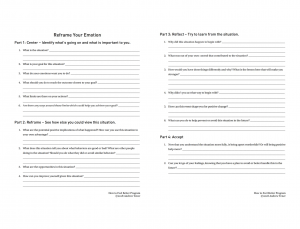Emotional understanding is not just about understanding past pain and achieving your goals. The methods you have learned are just as applicable to your present life. Healing is half the battle. The other half is preventing further emotional pain by deeply understanding the present.
When you don’t feel good about something that just happened, you can use emotional understanding to reframe your situation in a more positive light and accept your situation. This will prevent negative emotions from sticking around and becoming part of your base state.
Making It Work at Work
A friend of mine, Jack, joined a start-up early on. As the company grew, Jack found himself a manager, only below the C-suite of the company. He really wanted to move up somehow, but only the founders of the company and the very experienced professionals they had hired were given those titles. Jack felt that the company really liked him and that he was doing a great job in his role.
But one day, another manager was promoted to a new position of Vice President. Jack was very upset. He felt he was doing better work than the new VP. Not only that, but Jack had joined the company a year before the new VP. As Jack was telling me this, I stopped him, and asked Jack the implications of the promotion.
He expressed all of the negative implications. “They don’t appreciate me. They don’t know which employees are valuable. They don’t value the time people spent at the company.”
Then I asked Jack for positive implications. When Jack struggled, I suggested some. “The company is open to a new level. You can be promoted to that the new level, which is what you have wanted. You can ask the new VP how they got the role and learn how to improve.”
When Jack reframed what happened in this way, he was excited. What he thought was negative, turned out to be the opportunity for promotion he had been looking for. Jack spoke with the new VP, learned that the VP has simply proposed a larger role for her department and asked for a higher title.
Jack did the same. And, in a few months, Jack was also a VP.
Jack learned how important reframing the situation is. He was upset. But with reframing, he transformed his frustration into optimism.
The Lessons of Loss
What about situations where there aren’t new opportunities? Events like the loss of a loved one seem to only have downsides.
Loss is certainly harder to reframe than your typical problem. But recently, I attended the most beautiful memorial service I ever have. Instead of a funeral, it was a “celebration of life.”
Not only was this explicit on the invitation, but the speeches people gave were not ones of loss. Instead people spoke the virtues and lessons they had learned from their departed loved one. It was not a memorial of what had been lost, but a renewal of the beliefs and energy a person had brought to this world.
We cried, but not for loss. We cried for the opportunity to carry a torch that would light the world and make the world a better place. I left grateful for having had such a wonderful person in my life. I knew she would not have wanted anyone to grieve her. She would have wanted us to go forward, be happy, and make the world a better place.
So When Life Gives You A Lemon, Ask These Questions
Reframing can transform your experience. I have a handy list of questions that help me feel better and move forward when I am faced with a negative situation. Glance over this worksheet and come back here when you need to reframe something in your life.



